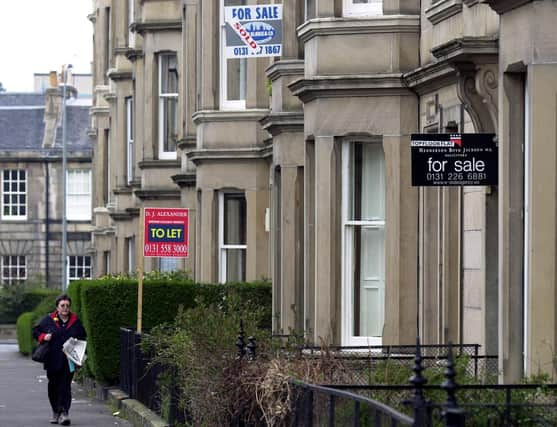Brian Monteith: Controlling rents even worse than the bombing of houses


Now, as we go into the third year of rent controls in Scotland, the inevitable signs are that a coming collapse in housing supply is coming down the tracks. It will be yet another continuity catastrophe for Humza Yousaf – after the delay of his government’s deposit return scheme, the abandonment of proposed alcohol advertising controls and his stubborn resistance to accept the Gender Recognition Bill being blocked by the UK Government.
The role of the Greens in demanding the SNP First Minister embraces such policy failures cannot be underestimated and Yousaf does not appear to have the guile to enforce the authority that should come from being the largest party in Holyrood. Why then hold out for keeping rent controls when they have repeatedly been proven to be against the interests of the very people they are meant to help – tenants renting properties in the private sector?
Advertisement
Hide AdAdvertisement
Hide AdConsider the history lesson. Designed to prevent landlords from profiteering during the war years when demand for housing exceeded supply the “Increase of Rent and Mortgage Interest (War Restrictions) Act” of 1915 restricted rents to their August 1914 level. What we might call a rent freeze. Although originally intended as a temporary measure rent control continued to be applied to the UK housing market in some rental agreements until 1989.
When introduced in 1915 private rented housing provided around 90% of the UK’s housing stock, by 1991 it had declined steadily to around 10%. Although it was not a lone factor in the decline of the private rental sector it was the dominant one in preventing new investment.
By reducing possible rent returns on property, investment quickly drains out of the private rental sector and goes elsewhere. As rental contracts close when tenants move on or die, properties are sold and the sector shrinks. Rentals on new properties with no previous rent to freeze reflect the scarcity and rentals shoot up, causing the few remaining investors to focus on the exclusive top end of the market. Homelessness, young couples staying on at their parents’ and a rising cost to housing benefit are all consequences.
As well as discouraging new construction, rent controls remove the incentive for landlords to raise or maintain the quality of their properties. A study in the United States found 29% of rent-controlled housing deteriorated whereas only 8% of uncontrolled housing fell into disrepair. Similar results were found in England and France.
The rent controls are often accompanied by other regulations such as preventing evictions of tenants, forcing up the risks and costs of being a landlord – costs they may not be able to recover from higher rents, causing more landlords to leave the market by selling up. As housing demand outstrips supply cashing-in often looks more attractive, even after paying Capital Gains Tax and other property sale taxes.
Berlin froze private rents in 2020 and available apartments fell by an astonishing 57% percent. Landlords kept any flats empty to see if the supreme court would declare the freeze unconstitutional – it did. Berliner’s then voted in a referendum to put 243,000 of the city’s 1.5 million rental apartments into public ownership but the Federal Government is against it. Tenants will now wait longer to find available properties until the impasse is resolved.
In the Netherlands a centre-right coalition has introduced its own form of rent regulation and investment into property has collapsed by 45%. In Spain, Covid-inspired rent controls are causing shortages as tourists now return after the pandemic subsided. In Ireland availability of a rented property can see enquiries running to a thousand and queues of potential tenants stretching down the length of the street.
No two rent controls are ever the same (all housing markets are different) yet over time the same trend develops, landlords abandon the market, housing stock deteriorates and scarcity in the private rented grows.
Advertisement
Hide AdAdvertisement
Hide AdRent controls and licensing regulations don’t just impact on residential property – in Scotland similar restrictions on self-catering properties imposed by the Scottish Government through local councils are causing significant financial hardship to owners – causing owners to bring a judicial Review of Edinburgh Council’s proposals. A Scottish survey showed 39% of owners ready to leave self-catering and 27% considering it.
By now you might be getting the picture rent controls simply do not work, and even when temporary there is always a convincing reason to keep them in place – who wants to be the politician allowing rents to rise to a realistic value?
As a result, the Scottish Government’s pandemic rent control and eviction ban continues, with the rent freeze now capping any increase at 3 per cent – and the Green Minister Patrick Harvie bullish about maintaining the controls.
A new study by Retties found investor interest in Scotland had “diminished” and plans for further legislation adding “to the uncertainty” while at the Scottish Property Federation annual conference Harvie was told hundreds of millions of pounds of investment has been lost, including major investor Legal & General, and that no new deals had happened since January.
It was in 1989 the Foreign Minister of the Socialist Republic of Vietnam said, "The Americans couldn’t destroy Hanoi, but we have destroyed our city by very low rents. We realized it was stupid and that we must change policy."
Humza Yousaf does not need to look far for problems – but they are all of his own Government’s making. When even communists see rent controls as worse than bombing it’s time to abandon continuity with Sturgeon’s legacy and Green ideological extremism.
Brian Monteith is a former member of the Scottish and European Parliaments and editor of ThinkScotland.org
Comments
Want to join the conversation? Please or to comment on this article.